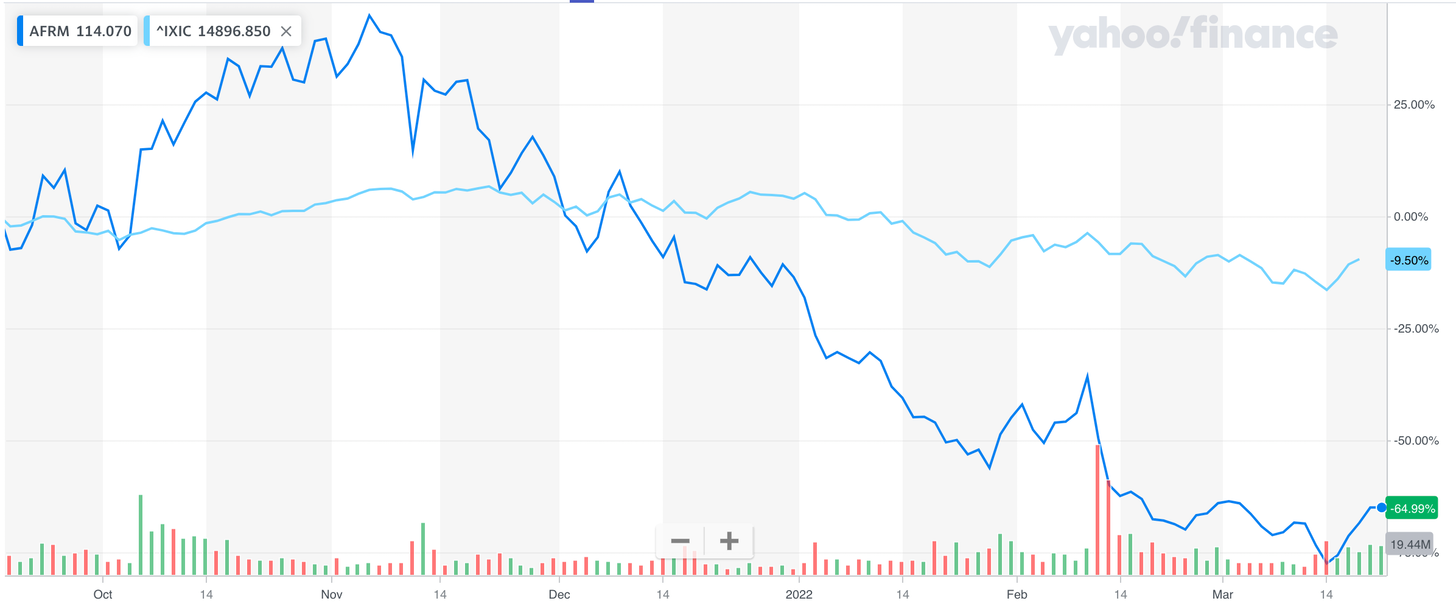This report was printed first in FIN, the most effective e-newsletter about fintech. Indicator up listed here.Â
Here is a surprising point to behold: in just the last five months, the sector benefit of Affirm—the commonly touted US market place chief in the burning-hot Purchase Now, Pay Afterwards (BNPL) sector—has plummeted by about $35 billion. At 1 position this week Affirm’s market capitalization dipped down below $10 billion for the very first time because going public in January 2021.
This is primarily shocking for at the very least two factors: a) the company was started, and is run, by Max Levchin, who’s typically thought of to have magical Wall Street powers b) Affirm proceeds to write-up phenomenal growth quantities (a lot more on this beneath).
So what is going on?
Indeed, fintech and technology shares in typical have experienced a tough time since late 2021, but Affirm has cratered even relative to that correction, and irrespective of the stock’s upward thrust in the latest days. Here is Affirm’s functionality in excess of the last six months until eventually Friday’s current market near, when compared to the tech-loaded Nasdaq index:
This is not what you count on from a business putting up 77% yearly income development, and overall transaction progress of 218%. You can forgive Affirm’s leadership for getting a little bit flummoxed by this treatment method. Levchin advised Bloomberg News in mid-February: “The sector appears to be owning a bit of an identity crisis. We are unquestionably not.â€
There are quite a few theories about Affirm’s plunge. One particular is a generalized sense of market place jitters, not helped by Russia’s invasion of Ukraine. On March 11, Bloomberg reported that Affirm had
delayed a proposed asset-backed securities sale on Friday following a good portion of it had previously been bought to dollars managers.
A main investor in the prime-rated part of the deal, also its greatest tranche at a lot more than $400 million, was claimed to have backed out at the final minute because of to common marketplace volatility that may possibly have led to broader possibility premiums than the organization needed, three persons with expertise of the make a difference mentioned. That AAA slice was nearly entirely bought when the transaction was halted, two of the traders mentioned.
Nonetheless it’s crystal clear from the chart earlier mentioned that the company’s current market problems go again months even further. The tumble beginning in mid-November suggests that buyers had been spooked (as in a lot of circumstances) by the escalating certainty of the Federal Reserve boosting interest charges to overcome historic inflation. BNPL, following all, is a kind of mortgage, typically an fascination-cost-free financial loan. If growing desire charges make capital much more costly for Affirm to acquire, it stands to purpose the enterprise will make less income. The firm acknowledged this when it announced earnings in mid-February it argues, on the other hand, that fascination level hikes in the quantities now contemplated will have only a modest outcome on the metric it utilizes to gauge its economic well being (which is income-minus-transaction-charges as a share of gross items benefit, or the whole amount purchased).
Another idea is that elevated competitiveness in the BNPL area is strengthening the negotiating power of merchants, allowing for them to pay out considerably less to Affirm, especially going forward. There is also the problem of ongoing regulatory investigations of Affirm and other BNPL companies, which could interfere with foreseeable future advancement and earnings.
But there is a broader feeling that BNPL as it has been practiced is not always what consumers want, or even what BNPL companies want to offer. (An Affirm agent cited to the Observer how tiny the BNPL current market is suitable now, in particular in the US, along with projections for expansion, and said that BNPL is “a incredibly attractive field to be in.â€)
Possibly. But many surveys have shown a substantial proportion of BNPL incurring money owed they could not find the money for. This 7 days, Bloomberg reported on a survey showing that nearly a quarter of BNPL people stop up with enhanced debt due to the fact they use credit cards to pay out off the BNPL personal loan.
The dynamic of a great deal of fintech businesses that have gone public remembers so vividly the dot-com period there is a giddy helium all over the preliminary thought and advancement that sidesteps any issues of profitability. But after industry actuality and level of competition established in, much of that helium shoots out of the stock balloon, and it’s not always evident, especially in the absence of gain, that it will reinflate.

